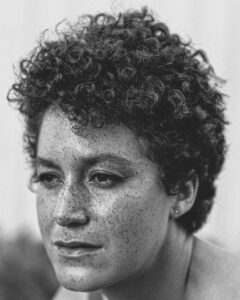
Assistant Professor of Art and Art History Kathryn Desplanque spoke to Dr. Ahalt about her experience as a humanist who has woven data science methods into her research and how the new School of Data Science and Society can support humanist researchers at UNC. Desplanque spoke on her core book project, which examines a corpus of 530 satirical images of artistic life in Paris published between 1750 and 1850. As she examined the evolution of artist typologies over time, she found that she needed a way to represent the corpus in its totality and store all the images, bibliographic information, and annotations / patterns without any information falling to the wayside and settled on NVIVO, a qualitative data analysis software. The software allowed Desplanque to track the evolution of the starving artist over time and cultural shifts. She shared that humanist researchers are jumping into data driven research, and are trying to think ethically and carefully about how information is collected and how subjects are engaged. Desplanque expressed an interest in bringing this ethical conversation to fields immersed in data science, expanding the notion of what data could be, and seeing the creation of databases of political cartoons, pieces of music, snapshots from a documentary and more. She emphasized the importance of remembering that all data is always human and collected by a human that is infusing the world of data science with preconceived contexts and biases. However, the humanities are not set up to support data science work, and researchers in these disciplines are often required to rely on underground cell networks that may lack resources or experience and fall below the standards of data science practitioners. Desplanque hopes that the School of Data Science will fill the need for a hub where researchers in the humanities can talk to people who regularly work in data science to help determine the best methods forward for their projects. She advised Dr. Ahalt to keep humanists in mind when hiring faculty, as researchers in the field may need resources and guidance on data collection and analysis best practices. The facilities conversations that will take place between researchers in different disciplines will likely trickle down to students and manifest in teaching. Towards the end of the conversations, she and Dr. Ahalt then discussed how the art world could contribute its data to interoperable research and open source data repositories and concerns among humanists around data archival and storage.
Click here to view the talk on YouTube.
Kathryn Desplanque, Assistant Professor of 18th and 19th Century European Art
Department: Art & Art History | Faculty Profile
Featured on: September 12, 2022 (Event Page)
Session Title: LIVE: School of Data Science and Society (Event Recap)
Tools, Information, and Resources:
- Lightning Talk | Inglorious Artists: Art-World Satire and the Market Economy for Art, 1750-1850: At the first Carolina Data Science Now seminar, Kathryn Desplanque spoke on her core book project, “Inglorious Artists: Art-World Satire and the Market Economy for Art, 1750-1850,” which examines a corpus of 530 satirical images of artistic life in Paris published between 1750 and 1850.
- The William Blake Archive: Over the course of two centuries, respect for the prints, paintings, and poems of William Blake (1757-1827) has increased to a degree that would have astonished his contemporaries. Today both his poetry and visual art in several media are admired by a global audience. In the broadest terms, the William Blake Archive is a contemporary response to the needs of this dispersed and various audience of readers and viewers and to the corresponding needs of the collections where Blake's original works are currently held.
- Scientific Data Journal: Scientific Data is a peer-reviewed open-access journal for descriptions of datasets and research that advances the sharing and reuse of research data.